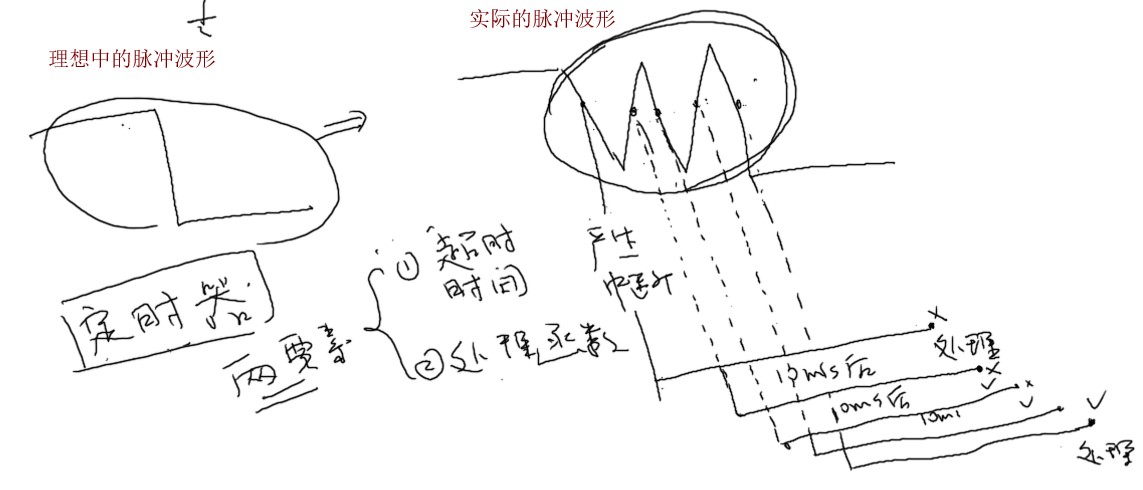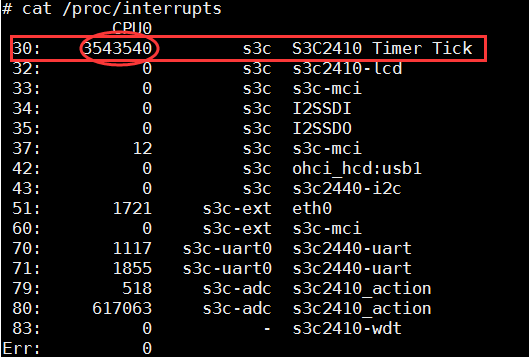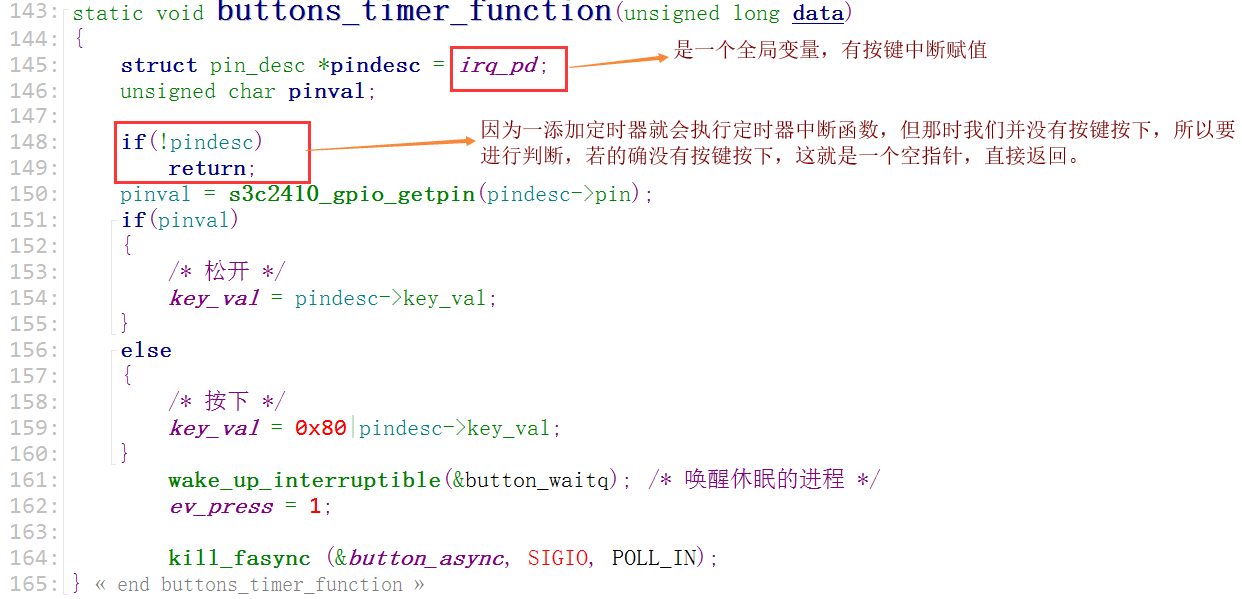使用定时器实现按键防抖(第十二课/第八节)
在执行以阻塞方式读取按键值的时候会有多个中断的出现

原因:因为按键是一个机械开关,按下松开的时候里面的金属弹片可能抖动了好几次,由于是边沿触发,导致多次中断的发生。

解决方法:定时器消抖
设计思路:
每产生一次IRQ中断就修改这个定时器的超时时间,直到产生最后一次IRQ中断后10ms才执行真正的中断函数。
首先看看别人是怎么使用这个定时器的:搜索 "add_timer"




我们仿造这也写一个这样的函数

根据我们的设计思路,每发生一次按键中断都会更改一次定时器的超时时间。所以在按键的中断函数里就只做重置超时时间的工作。

使用(cat /proc/interrupt)命令可以查看系统时间中断的时间

把我们真正想要处理的代码应该放在定时器的中断函数里面

定时器消抖驱动程序(seventh_chrdev.c)
#include <linux/module.h>
#include <linux/kernel.h>
#include <linux/fs.h>
#include <linux/init.h>
#include <linux/delay.h>
#include <linux/irq.h>
#include <linux/poll.h>
#include <asm/uaccess.h>
#include <asm/irq.h>
#include <asm/io.h>
#include <asm/arch/regs-gpio.h>
#include <asm/hardware.h>
/*
* eint 0 GPF0
* eint 2 GPF2
* eint 11 GPG3
* eint 19 GPG11
*/
static struct class *seventh_chrdev_class;
static struct class_device *seventh_chrdev_class_dev;
static volatile unsigned char key_val;
static struct timer_list buttons_timer;
static struct pin_desc *irq_pd;
static DECLARE_WAIT_QUEUE_HEAD(button_waitq);
/* 中断事件标志, 中断服务程序将它置1,s3c24xx_buttons_read将它清0 */
static volatile int ev_press = 0;
static struct fasync_struct *button_async;
static DECLARE_MUTEX(button_lock); //定义互斥锁 定义和初始化
struct pin_desc{
unsigned int pin;
unsigned int key_val;
};
struct pin_desc pins_desc[4] = {
{S3C2410_GPF0, 0x01},
{S3C2410_GPF2, 0x02},
{S3C2410_GPG3, 0x03},
{S3C2410_GPG11, 0x04},
};
static irqreturn_t button_irq(int irq, void *dev_id)
{
irq_pd = (struct pin_desc *)dev_id;
//这个jiffies是一个全局变量,它是系统时间,执行定时器中断的条件是:系统的时间大于等于定时器的超时时间
//系统的时间每10ms加一次
mod_timer(&buttons_timer, jiffies+HZ/100);
return IRQ_HANDLED;
}
static int seventh_chrdev_open(struct inode *inode, struct file *file)
{
printk("seventh_chrdev_open
");
if(file->f_flags & O_NONBLOCK) //非阻塞
{
if (down_trylock(&button_lock)) //试图获取信号量,如果获取不到就立刻返回
return -EBUSY;
}
else
{
/* 获取信号量 */
down(&button_lock);
}
request_irq(IRQ_EINT0, button_irq, IRQT_BOTHEDGE, "S2", &pins_desc[0]);
request_irq(IRQ_EINT2, button_irq, IRQT_BOTHEDGE, "S3", &pins_desc[1]);
request_irq(IRQ_EINT11, button_irq, IRQT_BOTHEDGE, "S4", &pins_desc[2]);
request_irq(IRQ_EINT19, button_irq, IRQT_BOTHEDGE, "S5", &pins_desc[3]);
return 0;
}
static ssize_t seventh_chrdev_read(struct file *file, const char __user *buf, size_t count, loff_t * ppos)
{
if (count != 1)
return -EINVAL;
if(file->f_flags & O_NONBLOCK)
{
if (!ev_press)
return -EAGAIN;
}
else
{
/* 如果没有按键动作, 休眠 */
wait_event_interruptible(button_waitq, ev_press);
}
copy_to_user(buf, &key_val, 1);
ev_press = 0;
return 1;
}
int seventh_chrdev_release(struct inode *inode, struct file *file)
{
printk("seventh_chrdev_release
");
free_irq(IRQ_EINT0, &pins_desc[0]);
free_irq(IRQ_EINT2, &pins_desc[1]);
free_irq(IRQ_EINT11, &pins_desc[2]);
free_irq(IRQ_EINT19, &pins_desc[3]);
up(&button_lock);
return 0;
}
static unsigned int seventh_chrdev_poll(struct file *file, poll_table *wait)
{
unsigned int mask = 0;
poll_wait(file, &button_waitq, wait); //不会立即休眠,只是把当前进程挂接进去
if (ev_press)
mask |= (POLLIN | POLLRDNORM);
return mask;
}
static int seventh_chrdev_fasync(int fd, struct file *filp, int on)
{
printk("seventh_chrdev_fasync
");
return fasync_helper(fd, filp, on, &button_async);
}
static struct file_operations seventh_chrdev_fops = {
.owner = THIS_MODULE, /* 这是一个宏,推向编译模块时自动创建的__this_module变量 */
.open = seventh_chrdev_open,
.read = seventh_chrdev_read,
.release = seventh_chrdev_release,
.poll = seventh_chrdev_poll,
.fasync = seventh_chrdev_fasync,
};
int major;
static void buttons_timer_function(unsigned long data)
{
struct pin_desc *pindesc = irq_pd;
unsigned char pinval;
if(!pindesc)
return;
pinval = s3c2410_gpio_getpin(pindesc->pin);
//printk("pinval = %d, irq_val = %d
",pinval, irq_val);
if(pinval)
{
/* 松开 */
key_val = pindesc->key_val;
}
else
{
/* 按下 */
key_val = (0x80 | pindesc->key_val);
}
wake_up_interruptible(&button_waitq); /* 唤醒休眠的进程 */
ev_press = 1;
kill_fasync (&button_async, SIGIO, POLL_IN);
}
static int seventh_chrdev_init(void)
{
init_timer(&buttons_timer);
buttons_timer.function = buttons_timer_function;
//buttons_timer.expires = jiffies + 15*HZ;
add_timer(&buttons_timer);
major = register_chrdev(0, "seventh_chrdev", &seventh_chrdev_fops); //注册
seventh_chrdev_class = class_create(THIS_MODULE, "seventhchrdev");
seventh_chrdev_class_dev = class_device_create(seventh_chrdev_class, NULL, MKDEV(major, 0), NULL, "seventh_chrdev");
return 0;
}
static void seventh_chrdev_exit(void)
{
unregister_chrdev(major, "seventh_chrdev"); //卸载
class_device_unregister(seventh_chrdev_class_dev);
class_destroy(seventh_chrdev_class);
}
module_init(seventh_chrdev_init);
module_exit(seventh_chrdev_exit);
MODULE_LICENSE("GPL");
测试程序(seventh_chrdev_test.c)
#include <sys/types.h>
#include <sys/stat.h>
#include <fcntl.h>
#include <stdio.h>
#include <sys/types.h>
#include <unistd.h>
int fd;
int main(int argc, char **argv)
{
volatile unsigned char key_val;
int ret;
fd = open("/dev/seventh_chrdev",O_RDWR); //阻塞方式
if(fd < 0)
{
printf("can't open!
");
return -1;
}
while(1)
{
ret = read(fd, &key_val, 1);
printf("ret : %d, key_val = 0x%x
", ret, key_val);
}
return 0;
}
测试:
- 修改Makefile
- 编译并拷贝到(first_fs)目录
- 加载模块(insmod ./seventh_chrdev.ko)
- 运行测试程序(./seventh_chrdev_test)
即使按上半小时也不会出现多次连续按下的键值了。
<wiz_tmp_tag id="wiz-table-range-border" contenteditable="false" style="display: none;">